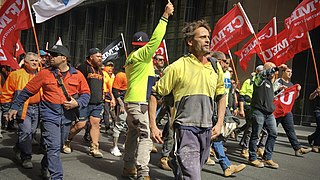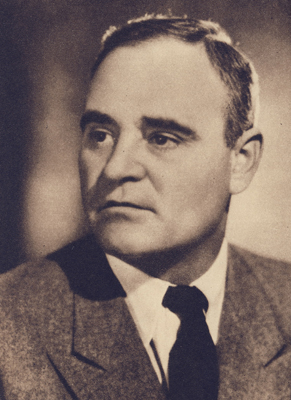
Syndicalism is a revolutionary current within the labor movement that, through industrial unionism, seeks to unionize workers according to industry and advance their demands through strikes, with the eventual goal of gaining control over the means of production and the economy at large through social ownership. Developed in French labor unions during the late 19th century, syndicalist movements were most predominant amongst the socialist movement during the interwar period that preceded the outbreak of World War II.

The Industrial Workers of the World (IWW), whose members are nicknamed "Wobblies", is an international labor union founded in Chicago in 1905. The nickname's origin is uncertain. Its ideology combines general unionism with industrial unionism, as it is a general union, subdivided between the various industries which employ its members. The philosophy and tactics of the IWW are described as "revolutionary industrial unionism", with ties to socialist, syndicalist, and anarchist labor movements.

Strike action, also called labor strike, labour strike and industrial action in British English, or simply strike, is a work stoppage caused by the mass refusal of employees to work. A strike usually takes place in response to employee grievances. Strikes became common during the Industrial Revolution, when mass labor became important in factories and mines. As striking became a more common practice, governments were often pushed to act. When government intervention occurred, it was rarely neutral or amicable. Early strikes were often deemed unlawful conspiracies or anti-competitive cartel action and many were subject to massive legal repression by state police, federal military power, and federal courts. Many Western nations legalized striking under certain conditions in the late 19th and early 20th centuries.

The Ruhr Red Army was an army of between 50,000 and 80,000 left-wing workers who conducted what was known as the Ruhr Uprising (Ruhraufstand), in the Weimar Republic. It was the largest armed workers' uprising in the nation's history, and ran from 13 March to 2 April, 1920, in Germany's most important industrial area. The workers were reacting to the Kapp Putsch, an effort by right-wing forces in March 1920 to overthrow the elected government.

Gheorghe Gheorghiu-Dej was a Romanian communist politician and electrician. He was the first Communist leader of Romania from 1947 to 1965, serving as first secretary of the Romanian Communist Party from 1944 to 1954 and from 1955 to 1965, and as the first Communist Prime Minister of Romania from 1952 to 1955.

The One Big Union is an idea originating in the late 19th and early 20th centuries amongst trade unionists to unite the interests of workers and offer solutions to all labour problems.

The Communication Workers Union (CWU) is the main trade union in the United Kingdom for people working for telephone, cable, digital subscriber line (DSL) and postal delivery companies. It has 110,000 members in Royal Mail as well as more in many other communication companies.

The Seattle General Strike was a five-day general work stoppage by 65,000 workers in the city of Seattle, Washington from February 6 to 11, 1919. The goal was to support shipyard workers in several unions who were locked out of their jobs when they tried to strike for higher wages. Most other local unions joined the walk-out, including members of the American Federation of Labor (AFL) and the Industrial Workers of the World (IWW). The national offices of the AFL unions were opposed to the shutdown. Local, state and federal government officials, the press, and much of the public viewed the strike as a radical attempt to subvert American institutions.

The All India Trade Union Congress (AITUC) is the oldest trade union federation in India. It is associated with the Communist Party of India. According to provisional statistics from the Ministry of Labour, AITUC had a membership of 14.2 million in 2013. It was founded on 31 October 1920 with Lala Lajpat Rai as its first president.
The eight-hour day was a social movement to regulate the length of a working day, preventing excesses and abuses of working time.

The Biennio Rosso was a two-year period, between 1919 and 1920, of intense social conflict in Italy, following the First World War. The revolutionary period was followed by the violent reaction of the fascist blackshirts militia and eventually by the March on Rome of Benito Mussolini in 1922.
The following is a timeline of labor history, organizing & conflicts, from the early 1600s to present.

The One Big Union (OBU) was a militant left-wing industrial union based primarily in Western Canada. Launched formally in Calgary on June 4, 1919, the OBU, after a spectacular initial upsurge, lost most of its members within a few years. It eventually merged with the Canadian Labour Congress in 1956.
The 1920 Alabama coal strike, or the Alabama miners' strike, was a statewide strike of the United Mine Workers of America against coal mine operators. The strike was marked by racial violence, and ended in significant defeat for the union and organized labor in Alabama.
The 1921 Buckingham and Carnatic Mills strike was a strike by the workers of Buckingham and Carnatic Mills in the city of Madras, India, against the managing company, Binny and Co. The strike, which lasted from June to October 1921, caused severe losses to the Madras economy. It also created a rift in the ruling Justice Party forcing many Dalit leaders to leave.

The March Action was a failed communist uprising in 1921, led by the Communist Party of Germany (KPD), the Communist Workers' Party of Germany (KAPD), and other far-left organisations. It took place in the industrial regions of Halle, Leuna, Merseburg, and Mansfeld, in the Province of Saxony. The revolt ended in defeat for the communists, and a weakening of contemporary communist influence in Weimar Germany.
A general strike is a strike action in which participants cease all economic activity, such as working, to strengthen the bargaining position of a trade union or achieve a common social or political goal. They are organised by large coalitions of political, social, and labour organizations and may also include rallies, marches, boycotts, civil disobedience, non-payment of taxes, and other forms of direct or indirect action. Additionally, general strikes might exclude care workers, such as teachers, doctors, and nurses.

The Industrial Workers of the World (South Africa) or IWW (SA) had a brief but notable history in the 1910s-20s, and is particularly noted for its influence on the syndicalist movement in southern Africa through its promotion of the IWW's principles of industrial unionism, solidarity, and direct action, as well as its role in the creation of organizations such as the Industrial Workers of Africa and the Industrial and Commercial Workers' Union.

The Red Guards, also known as Proletarian Defense Formations, were a paramilitary organization affiliated with the Italian Socialist Party (PSI) and later the Communist Party of Italy (PCdI) during the Red Biennium of the Kingdom of Italy.
Events from the year 1920 in Romania. The year was marked by the signing of the Treaty of Trianon and Treaty of Paris, and a general strike.














